Dr Cathy Burton - Cancer Research UK
Dr Cathy Burton - Cancer Research UK
Dr Cathy Burton - Cancer Research UK
Create successful ePaper yourself
Turn your PDF publications into a flip-book with our unique Google optimized e-Paper software.
<strong>Dr</strong> <strong>Cathy</strong> <strong>Burton</strong><br />
Associate Director SELCN and<br />
Macmillan GP Adviser<br />
17 December, 2010
Engaging GPs in Improving Early<br />
Diagnosis<br />
<strong>Dr</strong> <strong>Cathy</strong> <strong>Burton</strong><br />
Associate Director SELCN and<br />
Macmillan GP Adviser<br />
15.12.2010
Subdivision of delay<br />
Patient delay Delay in primary care Delay in secondary care<br />
Doctor delay<br />
System delay<br />
First<br />
symptom<br />
First<br />
contact<br />
with the GP<br />
Initiation of<br />
investigation of<br />
cancer-related<br />
symptoms<br />
Referral to<br />
hospital<br />
First visit<br />
at the<br />
hospital<br />
Referral to<br />
treatment<br />
Treatment<br />
initiation
Rate of 2 week referrals versus conversion<br />
rate by practice in Lambeth 2006<br />
30<br />
2WR per 1000 Patients vs % 2WR with <strong>Cancer</strong><br />
25<br />
20<br />
15<br />
10<br />
5<br />
0<br />
13<br />
14<br />
11<br />
29<br />
43<br />
23<br />
26<br />
28<br />
9<br />
44<br />
48<br />
35<br />
18<br />
33<br />
6<br />
15<br />
45<br />
41<br />
31<br />
4<br />
8<br />
20<br />
3<br />
27<br />
32<br />
7<br />
22<br />
46<br />
Practice code<br />
12<br />
40<br />
21<br />
51<br />
42<br />
24<br />
19<br />
36<br />
50<br />
47<br />
10<br />
16<br />
2<br />
1<br />
38<br />
25<br />
37<br />
5<br />
34<br />
39<br />
30<br />
17<br />
49<br />
2WRs per 1000 pts<br />
%2wr with cancer
Aims of the National <strong>Cancer</strong><br />
Primary Care Audit<br />
• Identify delays in primary care prior to<br />
diagnosis<br />
• Identify tumour groups or groups of patients<br />
vulnerable to delay
The Data Template<br />
• Uses picking lists to improve accuracy and consistency of data<br />
• Demographic data, communication problems, housebound<br />
status<br />
• Date symptoms first noticed, date patient presented to GP,<br />
date referred, date first seen by specialist<br />
• Main presenting symptom<br />
• Investigations in Primary Care<br />
• Referral route<br />
• Tumour type<br />
• Staging information at diagnosis (confined to organ, local<br />
spread, distant metastases)
Some Early Results of the<br />
National Audit<br />
• 18 <strong>Cancer</strong> Networks participated<br />
• 18,113 cases reported on<br />
• Quality of data high<br />
• Completeness of data 90%+ in most fields
Stage by tumour type<br />
50%<br />
45%<br />
40%<br />
35%<br />
30%<br />
25%<br />
20%<br />
Organ<br />
Local spread<br />
Distant metastases<br />
Not known<br />
15%<br />
10%<br />
5%<br />
0%<br />
Breast Ovary Cervix Lung CRC
Stage and Communication Difficulties<br />
50%<br />
45%<br />
40%<br />
35%<br />
30%<br />
25%<br />
No communication difficulty<br />
Communication difficulty<br />
20%<br />
15%<br />
10%<br />
5%<br />
0%<br />
Organ Local spread Distant mets Not known
Stage and Housebound Status<br />
50%<br />
45%<br />
40%<br />
35%<br />
30%<br />
25%<br />
Not housebound<br />
Housebound<br />
20%<br />
15%<br />
10%<br />
5%<br />
0%<br />
Organ Local spread Distant mets Not known
Benefits of the Primary Care Audit<br />
• GP Practices engaged with looking at their<br />
cancer cases and reflective learning<br />
• Raised awareness of referral guidelines in<br />
participating practices<br />
• Many practices identified changes to make to<br />
improve systems e.g. Reviewed how abnormal<br />
results are managed
Benefits of the Primary Care Audit<br />
• Has provided a huge body of data of high<br />
quality<br />
• Complements data from other sources<br />
• Allows localities to identify local issues<br />
– E.g. SE London identified problem with reporting<br />
of CXRs in A&E departments (not reviewed by<br />
radiologists some lung cancers missed)<br />
– Access to CT following equivocal CXR
What the cancer audit did not tell us<br />
• Not a good way to identify delays before<br />
presentation to the GP<br />
• Also not a good way to identify how long<br />
between first presentation and referral?<br />
• What about those practices which did not<br />
engage?
The Significant Event Audit Project<br />
• GPs undertook SEAs on 132 lung cancer cases<br />
• Analysed by team working with RCGP<br />
• Presentation of lung cancer is complex<br />
• Important to have safety-netting systems in<br />
place (to follow up, manage and refer nonresolving<br />
symptoms)<br />
• Important to have robust systems for<br />
following up abnormal results
The Significant Event Audit Project<br />
• Important for GPs to be aware of the recent<br />
history of presentations<br />
• It is difficult to distinguish new symptoms in<br />
patients with known chest disease<br />
• Consider lung cancer in the differential<br />
diagnosis of shoulder and neck pain<br />
• Patient education to encourage earlier<br />
presentation for new or ongoing chest<br />
symptoms
The Practice <strong>Cancer</strong> Profiles Project<br />
• Backed by funding from DH and NCAT<br />
• Aims to<br />
– Increase GP leadership for early diagnosis<br />
– Reach practices not previously engaged<br />
– Demonstrate a measurable change in outcome<br />
from undertaking the audit
The Practice <strong>Cancer</strong> Profiles Project<br />
• NCIN has collated metrics for every practice in<br />
England including:<br />
– Incidence of cancer<br />
– Screening uptake<br />
– Number of 2 week referrals<br />
• Breast, lung, colorectal and skin identified individually<br />
– Conversion rate<br />
– <strong>Cancer</strong> emergency admissions<br />
– <strong>Cancer</strong> emergency presentations
The Practice <strong>Cancer</strong> Profiles Project<br />
• GP leads identified in each area<br />
• GP leads to disseminate profiles to GP<br />
practices<br />
• GP leads to identify small number outlying<br />
practices in each area for one-to-one work<br />
• Outlying practices implement full audit cycle<br />
using primary care audit tool
Analysis of Lambeth Practice Profile data<br />
50<br />
Rank - 2week referrals (High to low)<br />
Rank (2ww with cancer - high to low)<br />
Rank emergengy admissions<br />
40<br />
30<br />
20<br />
10<br />
0<br />
STREATHAM HIGH PRACTICE (DR ASHBY)<br />
THE SURGERY (DR ALA)<br />
APMS SOLUTIONS LTD (DR M<strong>UK</strong>ADAM)<br />
MAWBEY GROUP PRACTICE (LOGAN)<br />
THE VALE SURGERY (DR RAMANAN)<br />
THE ROSENDALE SURGERY (DR CHAB<strong>UK</strong>)<br />
DR WINTER<br />
DRAKEWOOD ROAD MEDICAL CENTRE …<br />
NORWOOD SURGERY (DR FERNANDES)<br />
EDITH CAVELL NHS PRACTICE 1 (DR BELL)<br />
STREATHAM COMMON GROUP PRACTICE …<br />
DR SHAH<br />
VASSALL MEDICAL CENTRE (DR PATEL)<br />
THE CLAPHAM FAMILY PRACTICE (DR …<br />
THE DEERBROOK SURGERY (DR WRIGHT)<br />
THE TULSE HILL PRACTICE (DR AH-MOYE)<br />
THE STREATHAM HILL GORUP PRACTICE …<br />
WATERLOO HEALTH CENTRE (DR …<br />
THE WATER LANE SURGERY (DR SAIF)<br />
DR ARORA<br />
HETHERINGTON GROUP PRACTICE (DR …<br />
THE GRANTHAM CENTRE (DR …<br />
STREATHAM PLACE (DR AK SINGH)<br />
THIRTY ONE PRENTIS ROAD (DR …<br />
SOUTH LAMBETH ROAD (DR COSTA)<br />
CLAPHAM PARK GROUP PRACTICE (DR …<br />
PAVILION PRACTICE (DR PATEL)<br />
THE GRANTHAM CENTRE (MCGINN)<br />
MYATTS FIELD HEALTH CENTRE (WHITMEY)<br />
VALLEY ROAD SURGERY (DR PECK)<br />
THE SURGERY (DR FERREIRA)<br />
THE IVEAGH HOUSE SURGERY (DR …<br />
SANDMERE PRACTICE (DR GUPTA)<br />
BROCKWELL PARK (DR BRUML)<br />
STOCKWELL GROUP PRACTICE (DR …<br />
HURLEY CLINIC (DR POOLE)<br />
THE SURGERY (DR WHITTET)<br />
BRIXTON HILL GROUP PRACTICE (DR …<br />
HERNE HILL GROUP PRACTICE (DR …<br />
DR MASTERTON<br />
MANOR HEALTH CENTRE (SANTAMARIA)<br />
CROWN DALE MEDICAL CENTRE (DR …<br />
DR ASHTON<br />
THE MANOR HEALTH CENTRE (CURRAN)<br />
SPRINGFIELD PRIMARY CARE CENTRE …<br />
PAXTON GREEN PRACTICE (DR EVANS)<br />
LAMBETH WALK GROUP PRACTICE (DR …<br />
DR HU<br />
THE CORNER SURGERY (DR WICKSTEAD)<br />
DR IRANI<br />
THE EXCHANGE SURGERY (DR ROWLEY-…
Finally<br />
• Lung cancer is the commonest cause of cancer death<br />
in the <strong>UK</strong><br />
• Mortality is high, as very few are diagnosed at an<br />
operable stage<br />
• There is an easy test – the chest X-ray - but no<br />
screening test<br />
• Almost all present to GPs with symptoms
The problem: we GPs do a good job as<br />
gatekeepers<br />
• We are justifiably proud of <strong>UK</strong> general practice<br />
• The gatekeeper role has brought many<br />
benefits to patients, not least by ensuring the<br />
correct specialist is seen<br />
• It has also brought disadvantages, arising from<br />
GPs’ desire to use resources appropriately<br />
• In cancer this means not investigating the lowrisk<br />
symptom – and NICE tells us not to
Thank you<br />
<strong>Cathy</strong> <strong>Burton</strong><br />
calburton@gmail.com




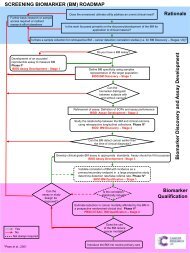
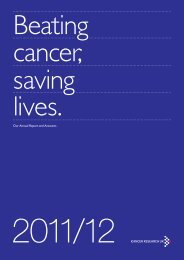
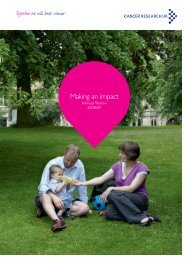
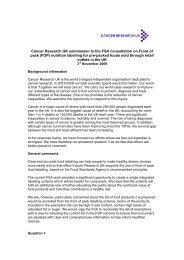
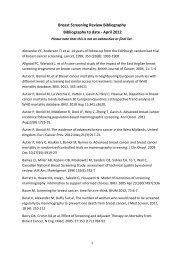
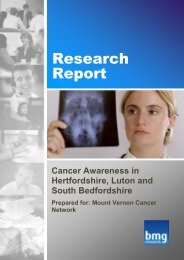
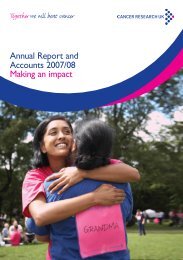


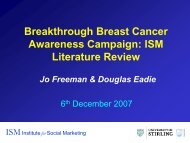
![[PDF] Cancer Research UK's strategy 2009 - 2014](https://img.yumpu.com/29239422/1/184x260/pdf-cancer-research-uks-strategy-2009-2014.jpg?quality=85)

